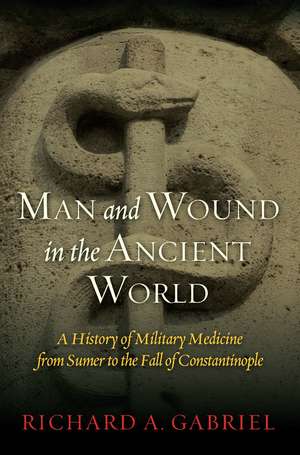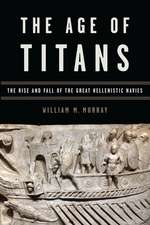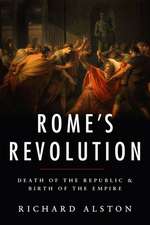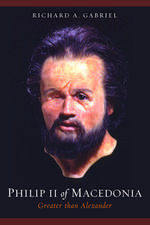Man and Wound in the Ancient World: A History of Military Medicine from Sumer to the Fall of Constantinople
Autor Richard A. Gabrielen Limba Engleză Hardback – noi 2011
Wounds and disease were as devastating on the battlefields of the ancient world as they are today. In an age of bloody combat, how did physicians and medics cope with arrow injuries, spear and sword gashes, dysentery, and infection without the benefits of anesthesia or modern medical technology? In this compelling volume, military historian Richard A. Gabriel explores the long-hidden world of ancient military medicine from 4000 BC to AD 1453 to reveal its surprisingly sophisticated body of knowledge, practice, and technique.
Ranging broadly from the deserts of North Africa, across the plains of India and Persia, to the mountains of Europe and Asia Minor, this book examines medical history from the Bronze Age through the Middle Ages. By revealing long-forgotten medical secrets, Dr. Gabriel shows how ancient civilizations’ technologies have influenced modern medical practices. Comprehensive, thoughtful, sometimes graphic, and always accessible, Man and Wound in the Ancient World will be welcomed by anyone who wants to learn how today’s medical miracles build upon those of the past.
Preț: 167.85 lei
Nou
Puncte Express: 252
Preț estimativ în valută:
32.12€ • 33.77$ • 26.54£
32.12€ • 33.77$ • 26.54£
Carte disponibilă
Livrare economică 27 martie-10 aprilie
Preluare comenzi: 021 569.72.76
Specificații
ISBN-13: 9781597978484
ISBN-10: 1597978485
Pagini: 276
Ilustrații: 5 figures; 5 tables; notes; bibliography
Dimensiuni: 162 x 234 x 29 mm
Greutate: 0.57 kg
Editura: Potomac Books Inc
Colecția Potomac Books
Locul publicării:United States
ISBN-10: 1597978485
Pagini: 276
Ilustrații: 5 figures; 5 tables; notes; bibliography
Dimensiuni: 162 x 234 x 29 mm
Greutate: 0.57 kg
Editura: Potomac Books Inc
Colecția Potomac Books
Locul publicării:United States
Recenzii
"Man and Wound in the Ancient World is a remarkably fresh look at five-and-a-half millennia of human history from the unique perspective of military medicine. No contemporary work so convincingly pulls all the different lines of evidence together as does Gabriel’s latest contribution to our knowledge of warfare in antiquity. Unmatched in the grand sweep of its treatment, this volume fills a great gap in military history and is a unique contribution to the history of medicine as well. Gabriel has once again focused our attention upon an important, but largely overlooked, aspect of war in the ancient world."—John Scott Cowan, principal emeritus, The Royal Military College of Canada; former department head, Faculty of Medicine, University of Ottawa; chair, Defence Science Advisory Board of Canada
"'It is interesting, if frightening, to contemplate in what state medical knowledge might have remained had it not been for the stimulus of war,' author/historian Richard Gabriel writes in Man and Wound in the Ancient World. In this, his latest of more than a dozen histories of ancient warfare, Gabriel makes the case that the crucible of ancient warfare—the spilling of blood and shattering of bones—prompted the surgical techniques, triage, and treatment at the core of modern medical care. This deftly researched book takes readers on a six-millennia 'staff ride' through ancient warfare, from Sumer through the Middle Ages, tracing the changing nature of combat, the wax and wane of medical knowledge, and the military framework upon which civilian medicine was formed."—David Lauterborn, managing editor, Military History Magazine
"The study of ancient military medicine is vital to an understanding of the broader aspects and development of warfare in antiquity. Yet it is an area that has often been neglected by scholars. Man and Wound in the Ancient World addresses this deficit in a truly comprehensive and interesting manner. Richard Gabriel’s latest book is destined to be the defining work in an area of great importance for the study of ancient military history and will fascinate historians and general readers alike."—C. A. Matthew, Macquarie University, Australia














